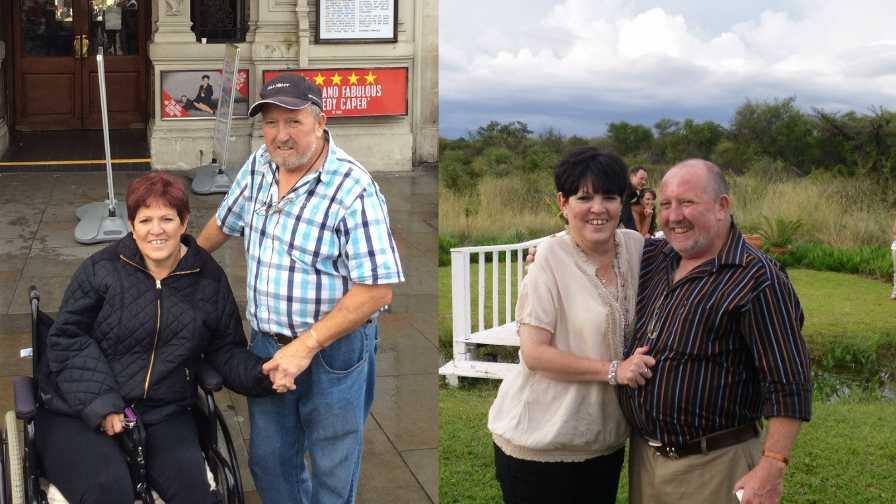Today on World Polio Day, Action Medical Research remembers its founder Duncan Guthrie who set up the charity 70 years ago in his quest to fight polio, which was rife in the UK at that time.
In the 1950s when Fiona Taylor contracted polio, there was an average of around 4,000 cases of polio a year in the UK.[1] In some years during epidemics, thousands were paralysed and hundreds died.[2] The last natural case of polio in the UK was in 1984, and the UK and Europe were declared polio free in 2003.[1] However, more recently, the polio virus has been found circulating in sewage in London.[1] Polio viruses found today are ‘vaccine-derived’ poliovirus type 2 (VDPV2) derived from the oral polio vaccine, which is no longer used in the UK. On rare occasions these viruses can cause serious illness, such as paralysis, in people who are not fully vaccinated.[3] Vaccine-derived poliovirus has the potential to spread, particularly in communities where vaccine uptake is lower, which is why today people are still encouraged to take up the inactivated polio vaccine and boosters in the UK.[4]
The charity Action Medical Research was instrumental in developing the polio vaccines in the UK. The founder of the charity, Duncan Guthrie, set up the charity when his daughter contracted polio at the age of 20 months. Action Medical Research, which was formerly known as the National Fund for Poliomyelitis Research, funded research to test and develop two polio vaccines for use in the UK during the 1950’s and 1960’s. The introduction of the vaccines was too late for Fiona Taylor, but she says that her story demonstrates the importance of being vaccinated against the polio virus.
“I was diagnosed with polio when I was a small baby – my mother found me with a high fever and unable to move. I was affected from the neck down and was only able to move my right leg. I was put in a mechanical respirator called an iron lung to stimulate my beathing and I required 24 hour care. With the help of daily physiotherapy, I was taught to use my arms and left leg to the best of my ability. I learned to start walking when I was 6 years old with the aid of a support on my left leg called a calliper.

Even though Fiona has coped well throughout her life including having three children, she is now working from home more after having worked in an office for many years, as she finds it difficult to move around. Fiona comments, “I experience a lot of pain which never seems to let up, but other than that I cope fairly well. I am so grateful for my husband and children who have always been there to help me. Thank you to Action Medical Research and the development of the polio vaccine, far fewer people are affected by this debilitating condition.”
In addition to its role in the introduction of the polio virus, Action Medical Research has developed an extraordinary track record in supporting some of the most significant medical breakthroughs in recent history – breakthroughs that have helped save thousands of children’s lives and changed many more such as ultrasound scanning in pregnancy, discovering the importance of taking folic acid and testing the rubella vaccine.
Commenting on Action Medical Research’s work, Sarah Moss, Director of Communications says: “World Polio Day is a time to remember the tireless efforts of our charity’s founder, Duncan Guthrie, whose determination to fight polio inspires us today, as we continue to work to save and change the lives of vulnerable babies, children and young people through vital medical research.”
For more about Action Medical Research please visit www.action.org.uk
-Ends-
1. UK Health Security Agency. Polio is spreading. Available at: Polio is spreading (text version) - GOV.UK (www.gov.uk). Accessed October 2022.
2. Vaccine Knowledge Project. Polio. Available at: Polio (Poliomyelitis) | Vaccine Knowledge (ox.ac.uk).
3. UK Health Security Association. Poliovirus detected in sewage from North and East London. Available at: Poliovirus detected in sewage from North and East London - GOV.UK (www.gov.uk). Accessed October 2022.
4. UK Health Security Agency. Inactivated polio vaccine (IPV) booster: information for healthcare practitioners. Available at: https://www.gov.uk/government/publications/inactivated-polio-vaccine-ipv-booster-information-for-healthcare-practitioners. Accessed October 2022.
Notes to editors
For more information on Action Medical Research, please contact Grace Wardley, Communications
and Engagement Officer:
T: 07725 090008
Follow us on Twitter at @actionmedres and @amr_events
Like our Facebook page at @actionmedres
Follow us on Instagram at @actionmedres and @actionevents
Action Medical Research is the leading UK-wide charity dedicated to saving and changing children’s lives through medical research. For 70 years we’ve helped pioneer ways to prevent disease and develop treatments benefiting millions of people. Our research has helped to beat polio in the UK, develop ultrasound in pregnancy, fight meningitis and prevent stillbirths. But we urgently need to develop more new treatments and cures for sick babies and children and we can’t do it without you.
Join our fight for little lives today.
Charity reg. nos 208701 and SC039284.
